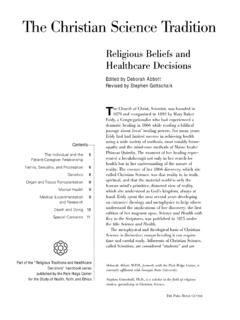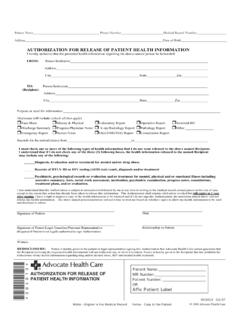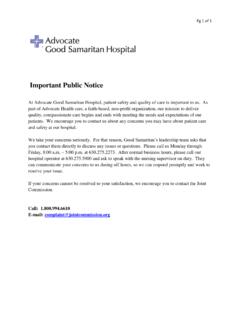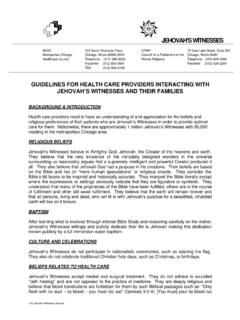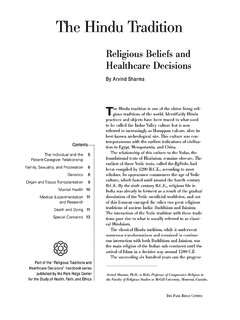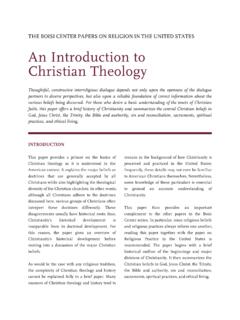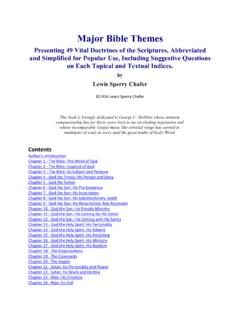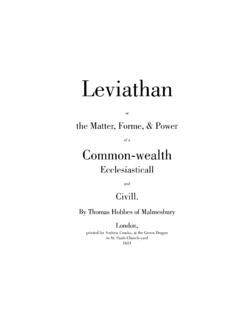Transcription of The Jehovah’s Witness Tradition - Advocate Health Care
1 The origins of the Jehovah s Witnesses go back to1879, when a Pittsburgh businessman namedCharles Taze Russell (1852-1916) began publishingthe magazine Zion s Watch Tower and Herald ofChrist s Presence. Two years later he founded Zion sWatch Tower and Tract Society, which was incorpo-rated in 1884 in Pennsylvania. Within ten years, asmall Bible study group had evolved into scores ofcongregations. In 1909 the society moved itsheadquarters to Brooklyn, New York, where itremains today. The name Jehovah s Witnesses wasadopted in 1931 (Watch Tower Bible and TractSociety of Pennsylvania [hereafter cited as WatchTower Society] 1974: 149-51).Jehovah s Witnesses base their beliefs on the Bible,which they regard as the inspired, inerrant Word ofGod. Their theology includes a doctrine of progressive revelation, however, which allows theirleaders to change biblical interpretations anddoctrines frequently (Penton 1997: 165-71). Forexample, they long taught that the present system ofthings would end before all members of the gener-ation alive in 1914 would die.
2 Now, although theyteach that the end, marked by the Battle ofThe Jehovah s Witness TraditionReligious Beliefs andHealthcare DecisionsEdited by Edwin R. DuBoseRevised by M. James Penton Contents The Individual and the 4 Patient-Caregiver RelationshipFamily, Sexuality, and Procreation6 Genetics7 Organ and Tissue Transplantation8 Mental Health8 Medical Experimentation9and ResearchDeath and Dying 9 Special Concerns 10 Part of the Religious Traditions and Healthcare Decisions handbook series published by the Park Ridge Center for the Study of Health , Faith, and EthicsTHEPARKRIDGECENTERE dwin R. DuBose, , is Senior Ethics Consultant and Directorof Clinical Ethics at the Park Ridge Center for the Study ofHealth, Faith, and James Penton, , is a retired professor of history and religious studies at the University of Lethbridge and a specialist inJehovah s , is still imminent, they no longerhold that it must come within the generation of1914 (Penton 1997: 316-17; Watchtower, 1 November 1995, 18, 19).
3 Armageddon will rid the earth of Satan andall his forces. Only Jehovah s Witnesses willsurvive this worldwide conflict, which will resultin a millennium of peace and righteousness,during which billions of dead persons will beresurrected and given a chance to provethemselves worthy of eternal life. During thisperiod an anointed class of 144,000 saints willrule with Christ in heaven as spiritual beings,while those loyal to Jehovah on earth willgradually regain the perfection had by Adamand Eve before the Fall (Watch Tower Society1995: 182-3).FUNDAMENTAL BELIEFS CONCERNINGHEALTH CAREIn their approach to Health , illness, and medicalcare, Witnesses are determined not to violatewhat they regard as God s standards concerningthe value and meaning of life in all its spiritualand physical aspects (Watch Tower Society 1990:6; Watch Tower Society 1989: 14). From thebeginning of the movement, Witnesses havestressed publishing and preaching above curingphysical and social ills. When the Millenniumarrives, they believe, all problems, includingthose related to Health , will be solved.
4 Russell,for example, felt that suffering could beredemptive, that instead of making one rebel-lious, it could refine one s character through the blessings of afflictions and sorrows and wouldhelp prepare one for the end time (Cumberland1986: 472). Suffering, patiently borne,strengthened also believed that disease was adegenerative process that began with Adam s fallfrom grace and would not be reversed until afterArmageddon. He also recognized a psychoso-matic element in illness, asserting that one halfof the people in the world are sick because theythink they are. In earlier times Witnessesperceived a demonic role in the origin ofdisability and disease (Cumberland 1986: 47-71).In contrast to many Christian denominations,the Witnesses did not create their ownhealthcare institutions. According to the WatchTower Society, they were not to operate hospitalsand clinics; the world s time was too short. Clayton J. Woodworth, the editor of The GoldenAgeand Consolationmagazines, was influentialin this area: he regarded the American MedicalAssociation as an institution founded onignorance, error, and superstition, denied thegerm theory of disease, attacked the use ofvaccination as a violation of God s law, andregarded the use of aluminum cookware asdangerous to Health (Penton 1997: 66).
5 Sincethe magazines edited by Woodworth were officialWatch Tower publications, most Witnessesbelieved that Woodworth s opinions representedofficial positions of the Society (Cumberland1986: 473). Jehovah s Witnesses no longer holdsuch views, and in recent years they have showna much more positive attitude toward modernscience and the medical the Witnesses rejection of bloodtransfusions is well known, many healthcareproviders have little knowledge of the widercontext of their views concerning Health and illness. The Governing Body of Jehovah sWitnesses has therefore encouraged the formation of hospital liaison committees inmajor cities with large medical institutions. By 1992, over one hundred committees existedin major cities in the United States to improveunderstanding between providers and theWitness community (Awake!22 November1990, 21; Kingdom Ministry, September 1992,3-5). In recent years Witnesses have generallysought and accepted qualified professionalhealth care within religious parameters such asrefusal of blood transfusions (Tabbert 1992: 2).
6 The majority rely on biomedical science andtrained medical personnel for their Health care (Watch Tower Society 1977: 27).2 THEJEHOVAH SWITNESSTRADITION: RELIGIOUSBELIEFS ANDHEALTHCAREDECISIONSJ ehovah s Witnesses are committed to theBible as a source of ethical values for allhumankind. Scripture is used as a guide for allaspects of life (including, for example, diet andhygiene). It also serves as the source of moralprinciples and ethical norms that have beenpassed down and followed through thecenturies. The way in which people respond tothese principles reveals a fundamental orien-tation to life. Ethical analysis is done throughreading and applying Scripture; because theBible does not comment directly on organ trans-plants, for example, decisions about transplantsare left to the individual Witness (Watchtower,15 March 1980, 31), although, curiously, formany years such transplants were regarded as aform of cannibalism (Watchtower, 15 November1967, 703; Penton 1997: 112-14). Because bonemarrow transplants may contain blood,Witnesses are cautioned that it may be wrong toaccept them (Watchtower, 15 May 1984, 31).
7 INSTITUTIONAL AUTHORITY ANDINDIVIDUAL CONSCIENCEIn their organization the Jehovah s Witnessesfollow what is said to be the pattern of theChristian congregation of the first century. Sincethe early 1970s, they have been directed by aGoverning Body, which determines doctrinal,legislative and judicial matters for them. TheGoverning Body consists of a small group ofelderly men who hope to join Christ in heavenas members of the 144,000 of Revelationchapters 7 and 14. Members of the GoverningBody do not consider themselves to be infallible,but all Jehovah s Witnesses are expected to obeytheir dictates on pain of excommunication. TheGoverning Body supervises the Society s publi-cations and appoints a Branch Committee ofthree or more men in each of the 111 branchesof the worldwide movement. These committeesappoint congregational elders and ministerialservants and supervise activities in the morethan two hundred countries in which theWitnesses have a presence (Watch Tower Society1986: 26-27; 1989: 9; 2002).
8 Each local congregation is governed by eldersor overseers who supervise it and look after itsneeds. These elders are not clergy; rather, theysupervise the instruction provided through theWatch Tower Society at meetings, lead inpreaching activities, and visit members toencourage them as needed. Elders also haveresponsibility to reprove and administer disci-pline through judicial committees to any whomay be following a wrong course and whoendanger the spiritual and moral purity andunity of the congregation. Under variouscircumstances Witnesses may be expelled fromtheir congregations as unrepentant wrong-doers, a practice known as disfellowshipping (Watch Tower Society, 1991: 90-100), or theymay simply be held to have disassociated themselves for such things as joining anotherreligious organization or serving in the armedforces (Watch Tower Society, 1991: 101-2). Theelders are assisted by ministerial servants whoare recommended by the elders; both elders andministerial servants serve voluntarily.
9 Allbaptized members are considered ordainedministers, although only a few serve as full-timeadministrators and pioneers, or full-timeevangelists (Watch Tower Society 1986: 12-13).Usually 18-25 congregations are grouped in acircuit and assemble twice a year for circuitassemblies or conventions. Once a year, largerdistrict conventions bring together a number ofcircuits in a program based on the spiritualneeds of Jehovah s Witnesses worldwide withrespect to their preaching work and , Witness congregations areorganized to cover their local area systematicallywith the preaching of the good news of God sKingdom as presented in the ChristianScriptures. So that such witnessing is done in anorderly fashion, the local branch office of theWatch Tower Society assigns an area to everycongregation. The congregation divides that areainto smaller portions, which are then assigned to3 THEPARKRIDGECENTER members who take the responsibility ofcontacting people with the Witnesses message. Since World War II the movement has grownrapidly.
10 Active door-to-door publishers orpreachers worldwide numbered 6,035,564 as ofAugust 2001 (Watch Tower Society 2002).Disappointment associated with the failure ofthe predicted Armageddon to arrive and therigid demands imposed on members by theirtradition may have accounted for many of thenearly 1,000,000 desertions from the movementthat occurred during the period from 1970 to1999 (Franz 2000: 34). There are nearly1,000,000 active Jehovah s Witnesses in theUnited States today (Watch Tower Society 2002).Generally Jehovah s Witnesses have goodrelations with healthcare providers andsupport medical work and practice with theexception of blood therapy and, to a lesserextent, psychiatry. With respect to blood therapy,commonly understood notions of an individual sautonomy play a negligible role in the moralreasoning of Witnesses. The key moral authorityfor them is not the right of self-determination,as claimed in secular bioethics, but rather theGoverning Body of Jehovah s Witnesses, whichis seen as overseeing Jehovah s channel of truthon earth.
